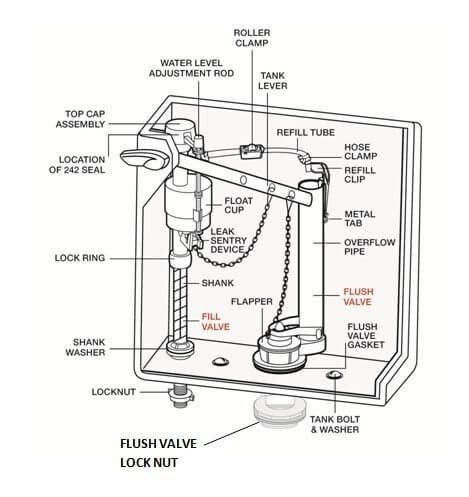How Can I Prevent a Plumbing Disaster?
Did you know it’s possible to prevent a plumbing disaster? Mostly all that’s needed is a little bit of preparation. Follow the tips in this article to be prepared before disaster strikes.
As I think back over the years of my plumbing career, three things come to mind that a homeowner can save lots of money on by having a little foresight.
- Water heater leaks
- Toilet leaks
- Water main leaks
Water heaters
Although you can’t know exactly when a water heater will start leaking, this should not be what you’re waiting for before you decide to replace it. It’s unlikely it will break at your convenience.
Here are some signs to look for that may indicate your water heater is about to go — leaving you in the wake of potential disaster.
1. Your water doesn’t get as hot as it used to. If you’re waiting longer and longer for your shower water to get hot, you’re likely paying more for all that water you’re wasting, which is annoying. There are a few reasons your water could be slow to heat up:
- The thermostat needs to be adjusted
- The heating element is broken
- The heater is too small for your house
The first couple of reasons are easy to fix. Your thermostat on the water heater should be between 120*-140* F. If it’s lower than this, simply adjust and start enjoying hot water again!
If there just isn’t any hot water coming out, it’s likely something is broken in the tank. If you give us a call we can grab the repair parts and get you up and going again in a few hours most of the time. If your water heater is under eight years old, this is likely the problem.
Sometimes the water isn’t heating as much because the tank is too small for your household. If there are more people living in your home now than there were 6-12 months ago, this is likely the reason.
You should start researching the next kind of water heater (tankless, etc.) you want to install. Give us a call if you need help selecting a brand and model.
2. The tank makes rumbling sounds. As your water heater ages, sediment builds up at the bottom of your tank and eventually hardens because it gets heated and reheated repeatedly.
If you start to hear rumbling noises, it’s because the hardened sediment is getting stirred around. This is a sign that your water heater is going to go out soon. The layer of sediment means your water heater will have less efficiency and more damage.
Your water heater will be less efficient because the heater will use more electricity or gas to heat your water, and it will have more damage because the extra time heating the water causes more wear and tear on your tank.
If your tank starts making rumbling noises, keep an eye out for small leaks. Regardless of whether you find any, it’s probably time to start planning to replace your heater.
3. Your hot water is rusty. If you start to notice rusty water coming from your water heater, there’s a good chance the inside of your water heater tank is rusting and will likely start leaking soon.
There’s a chance the rusty water isn’t from your water heater, but galvanized pipes instead. To figure out which one it is, drain a few five-gallon buckets of hot water from your heater. If the water is still coming out rusty after that, then it probably is your water heater that needs to be replaced (not your piping).
4. Your water heater is over 12 years old. Most water heaters are only built to last between 10-12 years, and while there are ways to extend the life of your water heater, if yours is getting old, you need to think about replacing it soon.
To determine the age of your water heater, look for the label on your tank that has the serial number. The first two digits represent the week or month, depending on the manufacturer. If the first digit is a letter, it represents the month. The 3rd and 4th number represent the year. For example, if the serial number is: F06B00345678, then the water heater was made in February 2006, indicated by the first 3 digits. If it started 1106…that would indicate November 2006.
If your water heater is getting old or is showing any of the other signs of wear and tear, it’s probably time to think about investing in a new unit.
5. There’s water around your tank. If you notice moisture around your tank, it’s possible you have a tiny leak or fracture in the tank. As the water heats, it causes the tank to expand slightly and when the metal cools, it causes the inner tank to stop leaking.
Before replacing your water heater, make sure there aren’t leaks coming from any connecting pipes or fixtures.
If your water heater is getting older or is showing any of these signs of wear and tear, believe me it’s better to start planning to replace it now! Give me a call and I can talk you through the types of water heaters available and help you assess what will be best for your home’s needs.
Want More Tips Like This? Have Them Delivered To Your Inbox.
Sign up for the Plumb Smart Newsletter for my best tips and tricks to make your plumbing last longer.
Toilets
Two most common issues with toilets are:
1. Worn out tank parts. If your toilet is older, or if your municipal water supply has some type of chlorine in it (most do), then it’s likely the parts have just worn out.

Use this helpful diagram from Fluid Parts Master if you aren’t familiar with the names of all the parts of your toilet (especially in the tank) to identify which ones need to be replaced. Then you can walk into your home improvement shop with confidence, knowing exactly what to ask for.
Because chlorine wreaks havoc on a toilet’s tank parts, I recommend replacing all the tank parts every three or four years. Or, you can have a whole house water filtration system installed that removes the chlorine throughout your house. You can read more about the one I recommend here.
2. Calcium deposit buildup in the siphon jet hole and rim holes. Calcium build up is really common, especially if you live in a place with hard water or are on well water because more lime and minerals are present in those kinds of water.
You can clean the calcium out with an acidic liquid like vinegar or lemon juice, or something a little more powerful (and quick) you can try a plumber’s cloth. I don’t recommend harsh chemicals but one of the other two suggestions should do the trick and make your toilet parts last longer. I also recommend this product to help prevent calcium build up in the first place.
Tackling toilet parts replacement and calcium deposits sounds a little tedious, but trust me it’s better than the alternative of having to replace the entire thing. Think and plan ahead and avoid emergencies later on!
Water main leaks
The third common cause of plumbing emergencies is related to leaks on your main water line. These are some signs you may have a leak on your water supply pipe from the meter to the house:
- You’re paying progressively higher water bills each month
- There’s a wet spot in the yard when it hasn’t rained or the sprinklers haven’t run
- You hear water running all the time
- There’s water seeping through the foundation wall
So, how in the world can you predict a water main about to start leaking? Well, you can’t exactly, but you can follow these steps to start planning when to replace your main water line:
- Find out what kind of pipe you have
- Find out how many of your neighbors have the same kind of pipe
- Find out who in your neighborhood has already replaced or repaired their water line and ask them why and when they had the work done.
With this information, you can make some educated assumptions about whether you can expect a problem with your water main anytime soon. Go ahead and get some quotes on replacing it; the value of replacing it will greatly outweigh the costs you incur due to water damage or plumbing disaster.
There is usually more than one way to do it and with different kinds of pipe. Do your homework now. Then, when and if it happens, you’ll have a good idea of what you’re looking at as far as costs are concerned.
In conclusion, try to see your home through a plumber’s eyes. This can prevent the great majority of plumbing disasters, leaving you headache free, and with the knowledge that your home and valuables are protected.
If you’re in the metro-Atlanta area, give us a call and we can help talk you through troubleshooting any of these common plumbing problem areas and can come out for repairs as well.
Schedule a Plumber
Schedule a plumber if you need assistance, we are happy to help.
Read our reviews to learn more about us or our services.

